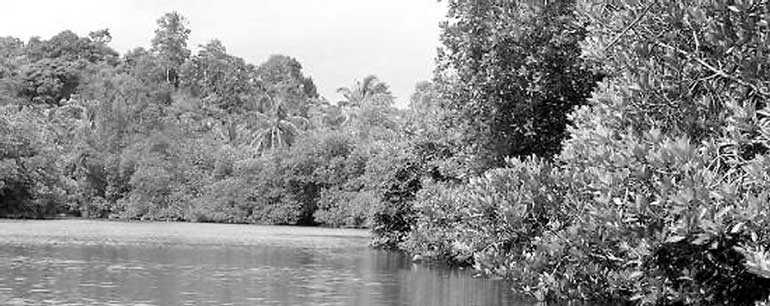Thursday Feb 26, 2026
Thursday Feb 26, 2026
Saturday, 28 September 2019 00:00 - - {{hitsCtrl.values.hits}}

The Madu Ganga

A serene stretch of the Madu Ganga

A Madu Ganga safari
The Pathfinder Foundation recently joined in efforts to clean up the Madu Ganga, which is a valuable biodiversity asset and a major tourist attraction in the Southern Province.
On the invitation of Balapitiya Pradeshiya Saba Chairman Saman De Silva, a meeting was held, which was attended by Central Environmental Authority (CEA) Director Susantha Wedage of the Southern Province; Wildlife Department Range Manager Uthpala Adaranga; Pathfinder Foundation Director Admiral Prof. Jayanath Colombage and Save Our Sri Lanka (SOS) Foundation Founder Chairperson Ulla Maschberger. The meeting focused on the state of pollution of the Madu Ganga through unauthorised construction, sightseeing boats and the flow of waste matter, including plastics and untreated sewage discharged into the river. The large number of boats carrying tourists in the Madu Ganga was also identified as a source of kerosene and engine oil pollution to the river, causing a serious threat to the environment while the high-speed movement of boats eroded the riverbanks.
Such activities negatively impact the livelihood of traditional fisher folk and residents of the area and destroy the breeding grounds of fish and prawns.
Considering these impediments affecting the population and environment, the meeting decided to set up a committee to address them immediately. The committee will carry out a primary survey of all activities in the Madu Ganga and identify threats to the environment in order to discover lasting and credible solutions. It was also decided to mitigate such threats and come up with an action plan within a reasonable timeline. At the Balapitiya discussion, all parties agreed to the proposal brought forward by Maschberger that her organisation equip boats with solar energy-powered electric outboard motors in order to stop kerosene leakage into the river and move on to the second phase of clearing the kerosene layer from the river with foreign assistance.
Admiral Prof. Colombage delivered his second lecture at the Galle Municipal Council on the invitation of the mayor in the interest of the elected members on the council to increase awareness on the ongoing threats to the environment and the inadvertent human hand involved in the mayhem. The lecture was titled ‘Let us protect our blue ocean and environment’.
Galle Municipal Council Mayor Priyantha B. Sahabandu and council members representing all parties and other sections of society, government officials and the SOS Foundation participated in the lecture. Admiral Prof. Colombage highlighted the value in maintaining sustainability in the blue ocean, as a means of deriving resources for the benefit of humanity. Highlighting the adverse effects of global warming, he pointed out that the ocean temperature had risen 13 % more than anticipated levels in the past decade in certain locations of the ocean and salinity and acidity levels in the sea water were also on the increase. He identified the dumping of plastics and untreated sewage as the two main causes of ocean pollution in the Galle area. The SOS Chairperson spoke of the efforts being taken by her organisation to collect waste plastics and highlighted the need to recycle them as part of a strategy to find solutions to the problem. The Deputy Mayor of Galle outlined the work in place to collect waste plastic as a strategy to address the situation. He also explained the Council’s preparedness to revamp its efforts and the community engagement to prevent ocean pollution through rivers and canals in the Galle area before the waste reached the ocean. The need for the education of people, especially fisher folk and children, about the harmful health and hygiene effects of dumping, especially single-use plastics, were highly appreciated as vital information by all. The meeting also agreed that the Municipal Council should work with all stakeholders in collecting, storing and transporting waste plastics to recyclers as an integral responsibility of the council.